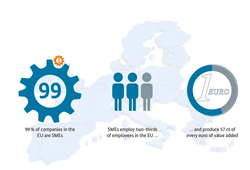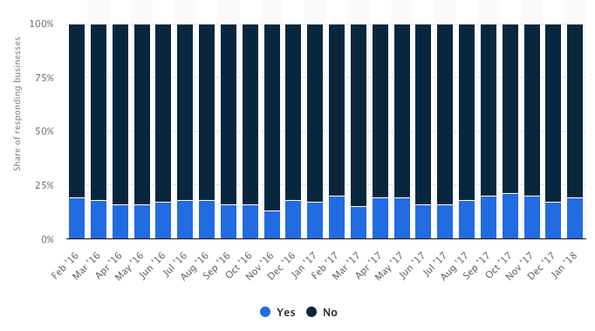
To start of with: Together, the German SME sector generates a considerably higher turnover than the 30 major companies listed on DAX combined and range among the most innovative SMEs in Europe. Small and medium-sized enterprises (SMEs) are the focal point in shaping enterprise policy in the European Union (EU). The European Commission considers SMEs and entrepreneurship as key to ensuring economic growth, innovation, job creation and social integration in the EU.
SMEs in Germany employ more than 15 million people in staff, provide vocational training for 4 in 5 apprentices in Germany. SMEs are a very important part of the economy, as they represent around 99 % of all enterprises and employ an increasing number of persons. In a European context, an SME has been defined by the European Commission as being a company with fewer than 250 employees and an annual turnover of less than 50 million euros (or total assets of less than 43 million euros). However, the German Mittelstand also includes companies with well over 500 employees and up to 500 million EUR annual turnover.
Most enterprises are independent and do not belong to an enterprise group, but within the SMEs medium-sized enterprises are very often part of a group. This is most common in manufacturing and to a lesser degree in knowledge-intensive business services.
Dependent SMEs are important in terms of employment and gross value added (GVA), especially in smaller countries such as Denmark, Norway and Finland. However, they are also significant in Germany where they account for 43 % of GVA created by SMEs in total and employ 34 % of the total number of persons employed by SMEs. Therefore, a large proportion of total growth created by SMEs can be attributed to dependent SMEs.
Large enterprises create a higher proportion of value added in the ‘high and medium/low tech manufacturing’ sector, while SMEs create a higher proportion of value added in the services sector. In most countries, dependent SMEs are more open to international trade than independent SMEs. In this regard dependent enterprises behave like large ones; they are also more exposed to shocks through international trade than independent SMEs.
Some figures: The statistics show the share of small and medium enterprises (SMEs) in Germany engaged in international trade from February 2016 to January 2018. From the responding SMEs during the most recent period, 19 percent were conducting business with international partners:
Expandeers is a multilingual global professional network of senior business development experts, providing reliable expansion support to SME around the world. Contact us at info@expandeers.com

